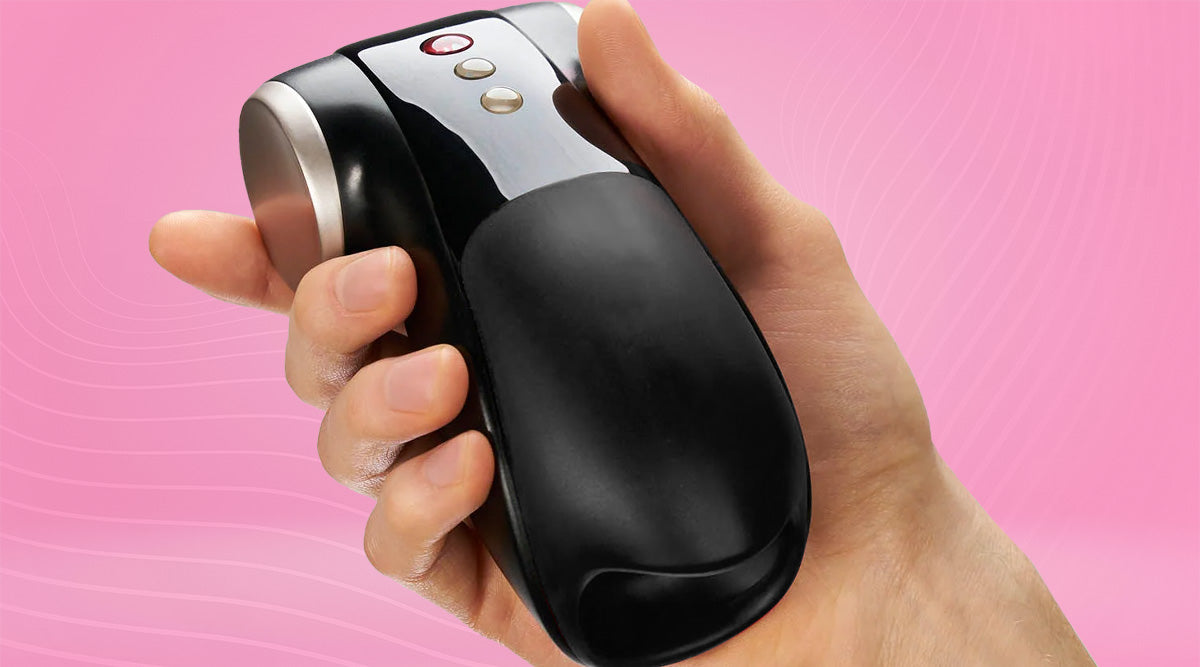How It Works Mobile
Health Benefits Mobile

Sexual Function for Men After Spinal Cord Injury
Sexual Function for Men After Spinal Cord Injury
10 min read
10 min read
A spinal cord injury can impact sexual function, but many men can still experience pleasure and intimacy with the right approach. Here's what to know about treatment options, assistive devices, and strategies for maintaining a satisfying sex life.

Science-based guidance to improve your sexual health & performance.
By The Private Gym Team
Table of Contents
- Physical Changes After SCI
- What are the Effects of SCI on Sexual Function?
- Will I Be Able to Get an Erection?
- What Can I Do to Help Get and Maintain an Erection?
- Emotional and Psychological Factors
- Tips for Enhancing Intimacy With Your Partner
- Will I Be Able to Ejaculate?
- Reproductive Options for Men with Erectile Dysfunction from SCI
- Risks of Having Intercourse with SCI
A spinal cord injury (SCI) can profoundly impact various aspects of life, especially sexual function for the spinal cord injured population. For many spinal cord-injured men, the most significant concerns are whether they will be able to engage in sexual activity, maintain erections, or stay intimate with their partners.
While SCI often causes changes in sexual function, many men still experience sexual pleasure, achieve erections, and even father children—depending on the severity and location of the injury. With the proper support and treatment, a fulfilling sexual life is still possible.
Physical Changes After SCI

Spinal cord injury (SCI) can lead to a range of physical changes that affect sexual function. Understanding these changes can help individuals and their partners adapt and find new ways to maintain intimacy and sexual satisfaction. Here are some common physical changes that can occur after SCI:
-
Erectile Dysfunction: SCI can damage the nerves that control erections, leading to difficulty achieving or maintaining an erection. This is a common issue for many men with SCI, but various treatments, such as medications and assistive devices, can help manage this condition.
-
Decreased Libido: Hormonal changes following SCI can lead to a reduced sex drive. This can be addressed through medical treatments focusing on emotional intimacy and connection with a partner.
-
Difficulty Achieving Orgasm: The nerves that control orgasm can be affected by SCI, leading to difficulty achieving orgasm or a decrease in orgasmic intensity. Exploring different types of stimulation and focusing on other erogenous zones can help enhance sexual pleasure.
-
Changes in Sensation: SCI can alter sensation in the genital area, leading to decreased or changed sensations during sex. Experimenting with different types of touch and stimulation can help discover new sources of pleasure.
-
Bladder and Bowel Dysfunction: SCI can impact bladder and bowel function, leading to incontinence or constipation. Proper management of these functions is essential to reduce anxiety and improve comfort during sexual activity.
Addressing these physical changes often involves a combination of treatments, including medications, assistive devices, and physical therapy. Working with healthcare professionals to develop a personalized treatment plan can help individuals with SCI manage these changes and maintain a healthy and fulfilling sex life.
What are the Effects of SCI on Sexual Function?

A spinal cord injury can disrupt the body’s ability to control various functions, including those related to sexual activity. The extent of the impact on sexual function depends on several factors, most notably the location and severity of the injury.
When the spinal cord is damaged, it can interfere with the communication between the brain and the nerves that control sexual responses, such as erections, ejaculation, and sexual pleasure, leading to sexual dysfunction. This disruption affects different components of sexual response, including the physiological and psychological mechanisms that govern sexual function.
The higher the injury is on the spinal cord, the more likely it is to affect these functions. In general, injuries located lower on the spinal cord, particularly near the sacral region, may have less impact on sexual function, but challenges can still arise.
The distinction between complete and incomplete injuries is also significant. A complete injury means there is no remaining communication between the brain and the areas below the injury, which can result in a total loss of sexual function.
In contrast, an incomplete injury allows for some degree of communication, which might preserve specific sexual responses, such as erections or sensations. The impact of spinal cord lesions on sexual function can vary, but challenges can still arise regardless of the injury location.
Irrespective of the injury type, many men with SCI can continue to engage in sexual activities. However, they may need to explore new ways to experience pleasure and maintain intimacy with their partners. For spinal cord-injured men, it is essential to explore beyond fertility issues to understand the full impact on sexual arousal and satisfaction.
Will I Be Able to Get an Erection?

One of the most common concerns for men after SCI is whether they will still be able to get an erection. The answer depends on the type and location of the injury, but many men with SCI can still achieve erections, even though the strength and duration may vary. For many spinal cord-injured men, the ability to achieve and maintain an erection is a primary concern.
There are two primary types of erections that men can experience after SCI: reflex erections and psychogenic erections.
-
Reflexogenic Erections: These erections occur in response to physical stimulation, such as touching the genital area. Reflexogenic erections rely on the spinal cord’s reflexes, which can still function even if the brain’s communication is interrupted. Men with SCI above the sacral region (S2-S4) are more likely to retain the ability to have reflexogenic erections.
-
Psychogenic Erections: These erections are triggered by sexual thoughts, fantasies, or visual stimuli and involve communication between the brain and the spinal cord. If the injury is above the thoracic level (T11-L2), psychogenic erections may be harder to achieve because of the disruption in communication between the brain and the relevant spinal nerves.
Men with SCI may experience one or both types of erections, though the ability to maintain an erection may vary. Despite these challenges, many men with SCI can still engage in sexual activity with the help of treatments and aids.
What Can I Do to Help Get and Maintain an Erection?

For men struggling to achieve or maintain erections after SCI, there are several treatment options available. The best option depends on the individual’s level of injury, personal preferences, and overall health. Here are some of the most common interventions:
-
Medications: Oral medications like PDE5 inhibitors (Viagra, Cialis) are commonly prescribed to help men with SCI achieve erections. These medications work by increasing blood flow to the penis, allowing men to get and maintain an erection when sexually aroused. While these drugs are effective for many, they may not work for all men with SCI, particularly those with severe injuries. It is essential to consult a healthcare provider to determine if this treatment is appropriate.
-
Vacuum Erection Devices (Penis Pumps): Penis pumps are another option for men with SCI. These devices work by creating a vacuum around the penis, drawing blood into the erectile tissue, and producing an erection. After achieving an erection, a constriction band is placed around the base of the penis to maintain it during intercourse. Penis pumps are non-invasive and effective for many men with SCI, making them a popular choice.
-
Medical Vibrators: Vibrators, such as the Viberect by Reflexonic, stimulate the penile nerves and help men achieve erections. These devices work by delivering targeted vibrations to the penile shaft, activating the reflex pathways involved in erection. Medical vibrators can be particularly useful for men with certain types of spinal cord injuries.
-
Penile Implants: For men who do not respond to medications or devices, surgical options like penile implants may be recommended. These implants come in two forms: inflatable implants and semi-rigid rods. Inflatable implants allow men to control when they want an erection by pumping saline into cylinders implanted in the penis. Semi-rigid rods keep the penis firm at all times but can be bent into different positions for sexual activity. Penile implants are a long-term solution, but they require surgery and carry some risks.
These treatments can be particularly beneficial for spinal cord-injured men who face challenges in achieving and maintaining erections.
In addition to these treatments, physical medicine plays a crucial role in the rehabilitation process, helping men with SCI improve their overall sexual health.
Emotional and Psychological Factors

Emotional and psychological factors play a significant role in the sexual well-being of individuals with spinal cord injuries (SCI). The emotional impact of SCI can be profound, leading to feelings of anxiety, depression, and low self-esteem. These emotions can affect a person’s ability to form and maintain intimate relationships, leading to social isolation and decreased sexual satisfaction.
Research has shown that individuals with SCI often experience a range of emotional and psychological challenges, including:
-
Body Image Issues: Physical appearance and function changes can lead to negative body image and low self-esteem.
-
Anxiety and Depression: The emotional impact of SCI can lead to anxiety and depression, which can affect sexual function and relationships.
-
Trauma: The experience of SCI can be traumatic, leading to post-traumatic stress disorder (PTSD) and other mental health issues.
-
Relationship Issues: SCI can affect relationships, leading to feelings of guilt, shame, and anxiety.
Addressing these emotional and psychological factors is essential to promote healthy sexual relationships and overall well-being. For spinal cord-injured men, addressing these emotional and psychological factors is vital in promoting healthy sexual relationships and overall well-being. Seeking support from mental health professionals, joining support groups, and maintaining open communication with partners can help individuals navigate these challenges and improve their sexual health.
Tips for Enhancing Intimacy With Your Partner

Achieving intimacy and pleasure is possible for individuals with SCI. While the physical aspects of sex may be affected, emotional intimacy and joy can still be experienced. Here are some tips for achieving intimacy and pleasure:
-
Communicate with Your Partner: Open and honest communication is essential for building intimacy and trust. Discuss your needs, desires, and any concerns you may have.
-
Explore New Ways of Experiencing Pleasure: Focus on highly sensitive non-genital areas, such as the neck, ears, and nipples. Experiment with different types of touch and stimulation to discover what feels good.
-
Use Assistive Devices: Assistive devices, such as vibrators and sexual lubricants, can enhance pleasure and intimacy. These tools can help compensate for physical limitations and provide new sensations.
-
Focus on Emotional Intimacy: Emotional intimacy is as important as physical intimacy. Spend time building a strong emotional connection with your partner through talking, cuddling, and sharing experiences.
For men with spinal cord injuries, discovering new ways to experience intimacy and pleasure is essential for a fulfilling sexual relationship.
Will I Be Able to Ejaculate?
For men with spinal cord injuries, the ability to ejaculate can be significantly affected, depending on the level and completeness of the injury. For many spinal cord-injured men, the ability to ejaculate can be substantially affected, depending on the level and completeness of the injury. Many men with SCI find it challenging to ejaculate naturally, mainly if the injury is located higher on the spinal cord.
Higher-level injuries tend to disrupt the nerves responsible for controlling ejaculation, making it difficult or impossible to ejaculate through traditional sexual activity. However, men with lower-level injuries, or incomplete injuries, may still be able to ejaculate, though it may be less forceful or occur less frequently than before the injury.
In some cases, men may experience retrograde ejaculation, where semen travels backward into the bladder instead of exiting through the penis. While this poses no direct health risk, it can affect male fertility. Men with SCI who wish to father children often need to explore assisted reproductive techniques, such as sperm retrieval and in vitro fertilization (IVF).
Additionally, medical devices like penile vibrators can help stimulate ejaculation for some men with SCI, allowing them to achieve this function even when natural ejaculation is difficult. Though challenging, with proper guidance and the use of modern medical technology, many men with SCI can find solutions to improve or restore their ability to ejaculate.
Reproductive Options for Men with Erectile Dysfunction from SCI

Men with SCI may face challenges in achieving fatherhood due to erectile dysfunction, ejaculatory dysfunction, and decreased fertility. However, there are several reproductive options available:
-
Penile Vibratory Stimulation (PVS): PVS is a non-invasive technique that uses a vibrator to stimulate the penis and induce ejaculation. This method can be effective for men with certain types of spinal cord injuries.
-
Electroejaculation: Electroejaculation is a medical procedure that uses electrical stimulation to induce ejaculation. This technique is often used when PVS is not adequate.
-
In Vitro Fertilization (IVF): IVF is a type of assisted reproductive technology (ART) that involves fertilizing an egg with sperm outside the body. This method can be used in conjunction with sperm retrieval techniques.
-
Sperm Retrieval: Sperm retrieval involves retrieving sperm from the testes or epididymis for use in ART. This can be done through various methods, such as testicular sperm extraction (TESE) or percutaneous epididymal sperm aspiration (PESA).
These reproductive options can help men with SCI achieve their goal of fatherhood despite the challenges posed by their injury. These reproductive options can help spinal cord-injured men achieve their goal of fatherhood despite the challenges posed by their injury.
Risks of Having Intercourse with SCI
Although sexual intercourse is generally safe for men with SCI, there are certain risks to be aware of:
-
Autonomic Dysreflexia (AD): Men with injuries above the T6 level are at risk of developing AD during sexual activity. AD is a condition where blood pressure spikes to dangerous levels in response to specific triggers, such as sexual stimulation or a full bladder. Symptoms include headaches, sweating, and a rapid rise in blood pressure. If AD occurs during intercourse, it’s essential to stop immediately and address the cause.
-
Skin Breakdown and Pressure Sores: Reduced sensation in certain body areas can increase the risk of skin damage during sexual activity. Men with SCI should avoid prolonged pressure on sensitive areas and use cushions or other aids to prevent skin breakdown.
-
Bladder and Bowel Management: Some men with SCI may worry about accidental bladder or bowel leakage during intercourse. Proper management of bladder and bowel function before sexual activity can help reduce this risk. Emptying the bladder and using appropriate medical devices can provide peace of mind.
For spinal cord-injured men, being aware of these risks is essential to ensure safe and enjoyable sexual activities.
Resources for Men with Spinal Cord Injuries
There are several resources available for individuals with SCI and their partners, including:
-
The National Spinal Cord Injury Association (NSCIA): The NSCIA provides information, resources, and support for individuals with SCI and their families.
-
The Spinal Cord Injury Rehabilitation Program: This program provides comprehensive rehabilitation services for individuals with SCI, helping them regain independence and improve their quality of life.
-
The American Spinal Injury Association (ASIA): The ASIA provides information, resources, and support for individuals with SCI and their families, promoting research and education in the field of spinal cord injuries.
-
The Craig Hospital Nurse Advice Line: This hotline provides advice and support for individuals with SCI and their families, offering guidance on managing health and wellness after a spinal cord injury.
These resources offer essential support and guidance, helping men with spinal cord injuries and their partners navigate challenges together.
Conclusion: Overcoming Sexual Challenges After Spinal Cord Injury

Experiencing a spinal cord injury significantly impacts daily life, including sexual function. However, many men can still enjoy a fulfilling sexual life post-injury. Understanding how your specific injury affects sexual health is crucial. With medical advancements, various treatments—such as medications, vacuum erection devices, medical vibrators, and penile implants—can help achieve and maintain erections and address ejaculation challenges.
Open communication with healthcare providers and partners is essential to navigate these changes. By addressing concerns and exploring solutions together, men with SCI can maintain intimate relationships despite challenges. Being aware of potential risks like autonomic dysreflexia and skin breakdown ensures sexual activities remain safe.
Sexuality remains a vital part of life, and a spinal cord injury doesn't have to diminish it. With the proper support and resources, men with SCI can continue to experience sexual pleasure and intimacy with their partners.
RELATED ARTICLES

Can Quadriplegic Men Have Sex?
5 min read

What is Penile Vibratory Stimulation?
8 min read

How to Use a Vibrator on Your Penis
8 min read
Recent Articles
- 12 Types of Female Orgasms: How to Help Her Experience Each One
- Why I Recommend You Get a Tantric Couch
- The Downsides of Penis Enlargement Surgery: Risks and Alternatives
- Bathmate vs. Air Pumps
- Bathmate Results: Penis Pump Before & After
- Side Effects of Catuaba
- Health Benefits of Catuaba
- 12 Essential Tips for a Healthy Penis
- Can Quadriplegic Men Have Sex?
- Sexual Function for Men After Spinal Cord Injury






























